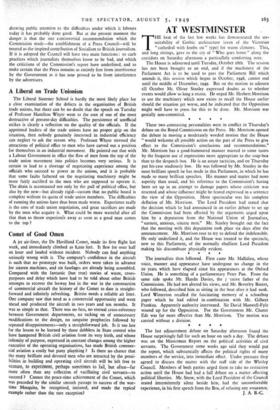AT WESTMINSTER
HE heat of the last few weeks has demonstrated the un- suitability of Gothic architecture (even of the Victorian "cathedral with knobs on" type) for warm climates. This, and long sittings, gave to the cry of " Who goes home " along the corridors on Saturday afternoon a particurarly comforting note.
The House is adjourned until Tuesday, October 18th. The session has not been brought to an end, and if the machinery of the Parliament Act is to be used to pass the Parliament Bill which amends it, this session which began in October, 1948, cannot end until the middle of December, 1949. But on the motion to adjourn till October Mr. Oliver Stanley expressed doubts as to whether events would allow so long a recess. He urged Mr. Herbert Morrison to use the machinery which now exists to recall the House earlier should the situation get worse, and he indicated that the Opposition might well have to press for this to be done. Mr. Morrison war genially non-committal. • * a * .
These two contrasting personalities were in conflict in Thursday's debate on the Royal Commission on the Press. Mr. Morrison opened the debate in moving a moderately worded motion that the House " would welcome all possible action on the part of the Press to give: effect to the Commission's conclusions and recommendations." Mr. Morrison has a good-humoured manner marred to some tastes by the frequent use of expressions more appropriate to the soap-box than to the despatch box. He is an astute tactician, and on Thursday put his case studiously low. He was followed by Mr. Stanley in the most brilliant speech he has made in this Parliament, in which he has made so many brilliant speeches. His manner and matter had more asperity than usual, and his reference to the Commission's having been set up in an attempt to damage papers whose criticism was resented and whose influence might be feared expressed in a sentence the view of the Opposition. More spectacular was his complete deflation of Mr. Morrison. The Lord President had stated that the decision which he had announced in an earlier debate to set up the Commission had been affected by the arguments urged upon him by a deputation from the National Union of Journalists, "earnest, anxious, sincere men." Mr. Stanley brought out the fact that the meeting with this deputation took place six days after the announcement. Mr. Morrison rose to try to defend the indefensible. He only underlined it, and the House was treated to the spectacle, new to this Parliament, of the normally ebullient Lord President making his discomfiture physically evident. * * a
The journalists then followed. First came Mr. Mallalieu, whose voice, manner and appearance have undergone no change in the zo years which have elapsed since his appearances at the Oxford Union. He is something of a parliamentary Peter Pan. From the same side spoke Mr. Haydn Davies, the r lative father of the Commission. He had not altered his views, and Mr. Beverley Baxter, who followed, described him as sitting in the boat after it had sunk. Lord Winterton recalled the fascinating memory of a schoolboy paper which he had edited in combination with Mr. Gilbert Frankau. Apparently authority intervened. Sir David Maxwell-Fyfe wound up for the Opposition. For the Government Mr. Chutcr Ede was far more effective than Mr. Morrison. The motion was carried without a division.
* * * * The last adjournment debate on Saturday afternoon found the House surprisingly full for such an hour on such a day. The debate was on the Masterman Report on the political activities of civil servants. The Government some weeks ago said they would put the report, which substantially affects the political rights of many members of the service, into immediate effect. Under pressure they agreed to discuss the matter with the staff side of the Whitley Council. Members of both parties urged them to take no restrictive action until the House had had a full debate on a matter affecting political liberties. Mr. Snow, with the Lord President of the Council seated intermittently silent beside him, had the uncomfortable experience, in his first speech from the Box, of refusing any assurance.
J. A. B.-C.


































 Previous page
Previous page